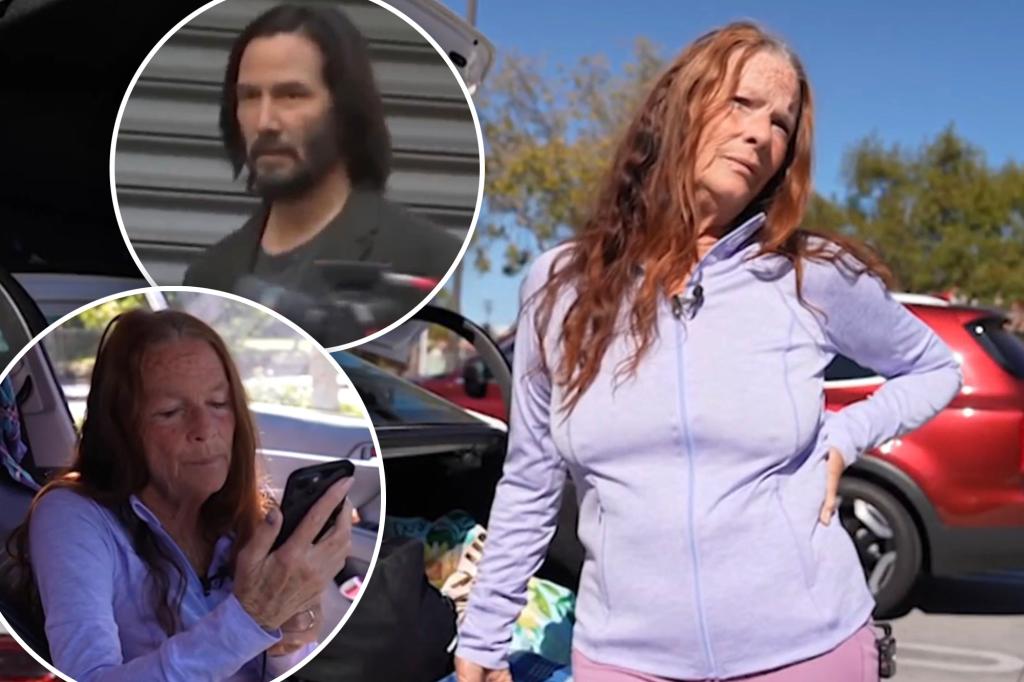Katherine Goodson, a 67-year-old widow from San Diego, found herself ensnared in a cruel deception that stripped her of her life savings and left her homeless. Her ordeal began in 2022, shortly after relocating to San Diego, when she received a text message from someone claiming to be the renowned actor Keanu Reeves. Initially skeptical, Goodson sent a $500 gift card as requested by the impersonator, but upon hearing his voice, recognized the deception and blocked the number. However, her vulnerability to this type of scam had been exposed, and she soon fell prey to a more elaborate scheme. Another individual contacted her, claiming to be the real Keanu Reeves, expressing sympathy for her previous experience and apologizing for the impersonator’s actions. This initiated a two-year-long exchange of messages, during which Goodson developed a deep emotional connection with the supposed actor, ultimately believing they were in love and even discussing marriage.
The illusion carefully crafted by the scammer preyed on Goodson’s loneliness and vulnerability following the loss of her husband in 2007. The supposed Reeves consistently offered excuses for their inability to meet in person, maintaining the illusion while strategically extracting money from Goodson. Over the two years, she sent him money, gift cards, and even Bitcoin, accumulating a devastating loss of over $60,000. The scam extended beyond the supposed Reeves, involving other individuals claiming to be members of his management team, further solidifying the fabricated reality in Goodson’s mind. These individuals likely coordinated their efforts to maintain the illusion and pressure Goodson for further financial contributions. The complex web of deceit effectively isolated Goodson from seeking help or questioning the situation, as she was surrounded by what she perceived as a supportive network connected to the supposed celebrity.
The charade came crashing down in August 2024 when Goodson’s resources were completely depleted. The once loving messages from "Reeves" and his "team" turned hostile, revealing the callous nature of the scam. The realization of her deception left Goodson in a state of shock and despair, describing the experience as "mind-boggling" and leaving her feeling utterly lost. The emotional and financial devastation has forced her to live in her car, struggling to rebuild her life from scratch. The cruel irony of her situation is that her attempt to protect herself from a scam by sending a small amount initially ultimately opened the door to a much larger, more devastating con. The scammers likely used the initial interaction to gauge her vulnerability and tailor their subsequent approach, exploiting her loneliness and desire for connection.
Despite the immense personal trauma, Goodson has courageously decided to share her story publicly. Having lost everything, she feels she has nothing left to lose and is determined to warn others about the dangers of online romance scams, particularly those targeting the elderly. Her story serves as a stark reminder of the devastating impact these scams can have, leaving victims emotionally scarred and financially ruined. Goodson’s experience underscores the importance of vigilance and critical thinking when engaging in online relationships, especially when those relationships involve individuals claiming to be celebrities or other high-profile figures. Her willingness to speak out, even in the face of such personal adversity, is a testament to her strength and resilience, offering a valuable cautionary tale to others.
Goodson’s case is unfortunately far from isolated. According to NBC affiliate KNSD, a staggering $1.1 billion was lost to romance scams across the U.S. in 2023, highlighting the widespread nature of this predatory activity. The increasing reliance on online communication and social media platforms has created fertile ground for scammers, who exploit the anonymity and ease of creating fake profiles to deceive unsuspecting victims. These scams often target vulnerable individuals, like Goodson, who are seeking companionship or connection. The scammers skillfully manipulate their victims’ emotions, building trust and intimacy before exploiting them financially. This methodical approach often leaves victims feeling ashamed and reluctant to come forward, further enabling the perpetrators. The widespread nature of these scams necessitates increased awareness and education to equip individuals with the tools to recognize and avoid such deceptive practices.
The specific use of Keanu Reeves’s identity in this scam highlights the growing trend of celebrity impersonation scams. Scammers leverage the public’s familiarity and admiration for celebrities to build credibility and foster trust with their victims. The fact that Reeves is known for his philanthropic activities and generally positive public image may have made him an even more appealing figure for scammers to impersonate, as it could lend an air of authenticity to their fabricated persona. Furthermore, Reeves’ lack of a public social media presence might have made it easier for the scammers to operate without fear of immediate exposure. This case underscores the importance of verifying the identity of individuals encountered online, particularly those claiming to be celebrities or public figures. It also highlights the need for increased vigilance and skepticism when engaging in online relationships, regardless of how convincing the other party may seem. The pervasive nature of these scams requires a multi-faceted approach, including public awareness campaigns, improved online security measures, and robust law enforcement efforts to combat these predatory practices.


